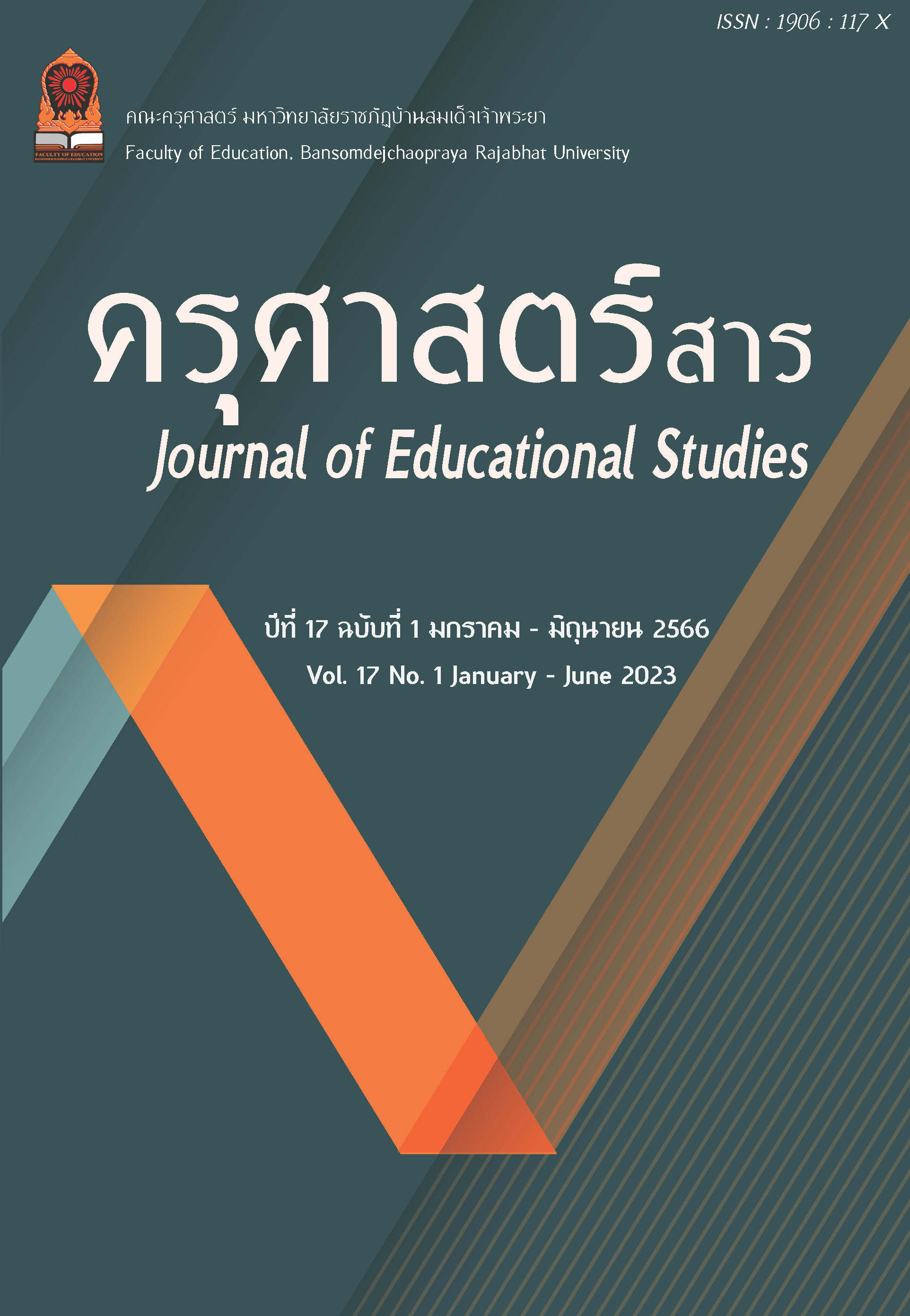A Study of Disruptive Leadership of School Administrators in the Eastern Economic Corridor (EEC)
Keywords:
Disruptive, Leadership, School Administrator, Eastern Economic CorridorAbstract
This research aimed to 1) investigate the level of disruptive leadership of school administrators in the Eastern Economic Corridor (EEC) 2) compare the level of disruptive leadership as classified by gender, educational background and work experience and 3) study guidelines for disruptive leadership development of school administrators in the Eastern Economic Corridor (EEC). The 512 samples consisted of 256 school administrators and 256 academic teachers in schools under the office of Primary Educational Service Areas in the Eastern Economic Corridor (EEC) which were obtained by proportional stratified random sampling. The tools used in the research was a set of 5-rating scale questionnaires. The statistics used in the data analysis were frequency, percentage, mean, standard deviation, and t-test for independent Samples. The research findings were as follow:
1. The level of disruptive leadership of school administrators in schools under the office of Primary Educational Service Areas in the Eastern Economic Corridor (EEC) as a whole was at a high level, ranking from high to low of mean scores; there were digital leader, creative thinking, innovation focus, risk management, strategy, continuous Learning, integration, network, empowerment and commitment respectively.
2. Comparison of disruptive leadership level of school administrators as classified by gender, educational background and work experience found that the differences were not statistically significant respectively.
3. Guidelines for disruptive leadership development of school administrators in the Eastern Economic Corridor (EEC), there were continuous learning self development, adapting and accepting disruptive changes, Keeping up with technological advances and innovations, educational innovation development and management, strategic and creative thinking, participating in meetings, training, seminars on innovation and new technologies, practicing decision-making skills in different situations, empowering people in operations, seeking collaborative networks to improve the quality of education both personal, ICT networks and social media, etc.
Downloads
References
จารินี สิกุลจ้อย. (2558). ภาวะผู้นำเชิงสร้างสรรค์ของผู้บริหารสถานศึกษาที่ส่งผลต่อบรรยากาศของโรงเรียน สังกัดสำนักงานเขตพื้นที่การศึกษาประถมศึกษาฉะเชิงเทรา เขต 2. วารสารวิจัยราชภัฎพระนคร. 10 (1), 45-56.
จีระยุทธ พุทธรักษาพิทักษ์. (2564). จินตนาการใหม่กับการพัฒนาภาวะผู้นำในยุคโลกเปลี่ยน. วารสารวิชาการแสงอีสาน มหาวิทยาลัยมหามกุฏราชวิทยาลัย วิทยาเขตอีสาน. 18(1); 21-33.
จีราภา ประพันธ์พัฒน์. (2560). การศึกษาภาวะผู้นำเชิงนวัตกรรมของผู้บริหารสถานศึกษาตามความ คิดเห็นของครู สังกัดสำนักงานเขตพื้นที่การศึกษาประถมศึกษาปทุมธานี. วิทยานิพนธ์ ศษ.ม.(การบริหารการศึกษา). ปทุมธานี : มหาวิทยาลัยเทคโนโลยีราชมงคลธัญบุรี.
จุฑาทิพย์ ชนะเคน. (2559). การศึกษาคุณลักษณะภาวะผู้นำเชิงนวัตกรรมของผู้บริหารสถานศึกษา สังกัดสำนักงานเขตพื้นที่การศึกษาประถมศึกษาพิษณุโลก เขต 3. การศึกษาค้นคว้าอิสระปริญญา ศษ.ม.(การบริหารการศึกษา). พิษณุโลก : มหาวิทยาลัยนเรศวร.
ชัชชญา พีระธรณิศร. (2563). ความท้าทายการจัดการศึกษาในยุค Disruptive Change ของผู้บริหารสถานศึกษา.วารสารศึกษาศาสตร์ มหาวิทยาลัยเชียงใหม่. 4(2); 126-139.
ธันตกร ไชยมงคล. (2556). ความสัมพันธ์ระหว่างภาวะผู้นำการเปลี่ยนแปลงกับความพึงพอใจ ในการปฏิบัติงานของครู กลุ่มโรงเรียนบางละมุง 1 สังกัดสำนักงานเขตพื้นที่ การศึกษาประถมศึกษาชลบุรี เขต 3. งานนิพนธ์การศึกษามหาบัณฑิต, สาขาวิชาการบริหารการศึกษา, คณะศึกษาศาสตร์, มหาวิทยาลัยบูรพา.
นุช สัทธาฉัตรมงคล และอรรถพล ธรรมไพบูลย์. (2559). ผู้นำการเปลี่ยนแปลงในยุคโลกาภิวัฒน์สู่การพัฒนาอย่างยั่งยืน.วารสารธุรกิจปริทัศน์. 8(1); 167-182.
ทศพล สุวรรณราช. (2564). ภาวะผู้นำดิจิทัลของผู้บริหารสถานศึกษา สังกัดสำนักงานเขตพื้นที่การศึกษามัธยมศึกษานนทบุรี.วารสารมนุษยศาสตร์และสังคมศาสตร์ มหาวิทยาลัยราชพฤกษ์, 7 (3), 160-177.
ปทุมพร เปียถนอม. (2563). ภาวะผู้นำทางการศึกษายุคการแทนที่ด้วยสิ่งใหม่กับทิศทางการศึกษาไทย. วารสารมนุษยศาสตร์และสังคมศาสตร์ มหาวิทยาลัยนครพนม. 10(3) : 115-123.
ปาริฉัตร นวนทอง (2564). ภาวะผู้นำเชิงนวัตกรรมของผู้บริหารสถานศึกษาสังกัดสำนักงานเขตพื้นที่การศึกษา ประถมศึกษาพัทลุง เขต 2. การประชุมหาดใหญ่วิชาการระดับชาติและนานาชาติครั้งที่ 13.
พวงรัตน์ ทวีรัตน์. (2550). วิธีการวิจัยทางพฤติกรรมศาสตร์และสังคมศาสตร์. (พิมพ์ครั้งที่ 8). กรุงเทพฯ : สำนักพิมพ์จุฬาลงกรณ์มหาวิทยาลัย.
เลอศักดิ์ ตามา และสุมาลี ศรีพุทธรินทร์. (2564). ภาวะผู้นำยุคดิจิทัลของผู้บริหารสถานศึกษาที่ส่งผลต่อการดำเนินงานระบบประกันคุณภาพการศึกษาของสถานศึกษาสังกัดสำนักงานเขตพื้นที่การศึกษามัธยมศึกษา เขต 22. วารสารรัชต์ภาคย์. 15 (38), 224-240.
สมหมาย โอภาษี. (2558). ความสัมพันธ์ระหว่างภาวะผู้นำการเปลี่ยนแปลงของผู้บริหารโรงเรียน กับความพึงพอใจในการปฏิบัติงานของครู สังกัดสำนักงานเขตพื้นที่การศึกษาจันทบุรี เขต 1. วิทยานิพนธ์ครุศาสตรมหาบัณฑิต, สาขาวิชาการบริหารการศึกษา, บัณฑิตวิทยาลัย, มหาวิทยาลัยราชภัฏรำไพพรรณี.
สุกัญญา แช่มช้อย. (2561). การบริหารสถานศึกษาในยุคดิจิทัล. กรุงเทพฯ : สำนักพิมพ์แห่งจุฬาลงกรณ์มหาวิทยาลัย.
สำเร็จ นางสีคุณ. (2565). การพัฒนาตัวบ่งชี้ Disruptive Leadership สำหรับผู้บริหารสถานศึกษา. วิทยานิพนธ์ศึกษาศาสตรดุษฎีบัณฑิต. สาขาการบริหารการศึกษา มหาวิทยาลัยขอนแก่น.
Carney, M. (2018). Reflections on Leadership in a Disruptive Age. London: Regent’s University London.
Cronbach, L.J. (1990). Essentials of Psychological Testing. (5th ed.). New York: Harper & Row.
Creswell, J. W. (2011). Educational Research: Planning, Conducting, and Evaluating Quantitative and Qualitative Research. New Jersey: Pearson Education International.
Hogan, R., & Hogan, J. (2007). Hogan Personality Inventory manual. Tulsa, OK : Hogan Press.
Kao, R. (2018). Disruptive leadership: Apple and the technology of caring deeply-Nine keys to organizational excellence and global impact. New York : Productivity Press.
Khan, R. (2018). Disruptive Leaders. The definitive traits of leaders whoare changing The world around us. Retrieved from http://www.risingkashmir.com/news/disruptiveleaders-326625.htm
Krejcie, R. V. & Morgan, D. W. (1970). Determining Sample Size for Research Activities. Educational and Psychological Measurement. 30(3), 607-610.
Mirkay N. & Palma J. Strand. (2019). Disruptive Leadership in Legal Education. 22 RICH. PUB. INT. L. REV. 365 Available at: https://scholarship.richmond.edu/pilr/vol22/iss3/3.
Promsri, C. (2019). The Developing Model of Digital Leadership for a Successful Digital Transformation. GPH-International Journal of Business Management, 2(08), 01-08. Retrieved from http://gphjournal.org/index.php/bm/article/view/249
Hogan & Hogan (2008). Leadership and the Fate of Organizations. Psychologist 63(2):96-110
Melvin J. M. (2017). Why Disruptive Leadership Works. https://www.researchgate.net/publication/318419290.
Warren C. (2013), Disruptive Leadership is not a Solo Act. Insigniam Quarterly Winter 2013.
Timmons, R.A. (2021), Exploring Global Disruptive Leadership in Practice: A Multi-Level Pragmatic Model.Indiana Institute of Technology ProQuest Dissertations Publishing, 28720149.
Downloads
Published
How to Cite
Issue
Section
License

This work is licensed under a Creative Commons Attribution-NonCommercial-NoDerivatives 4.0 International License.
บทความที่ได้รับการตีพิมพ์เป็นลิขสิทธิ์ของคณะครุศาสตร์ มหาวิทยาลัยราชภัฏบ้านสมเด็จเจ้าพระยา
ข้อความที่ปรากฏในบทความแต่ละเรื่องในวารสารวิชาการเล่มนี้เป็นความคิดเห็นส่วนตัวของผู้เขียนแต่ละท่านไม่เกี่ยวข้องกับมหาวิทยาลัยราชภัฏบ้านสมเด็จเจ้าพระยา และคณาจารย์ท่านอื่นๆในมหาวิทยาลัยฯ แต่อย่างใด ความรับผิดชอบองค์ประกอบทั้งหมดของบทความแต่ละเรื่องเป็นของผู้เขียนแต่ละท่าน หากมีความผิดพลาดใดๆ ผู้เขียนแต่ละท่านจะรับผิดชอบบทความของตนเอง



